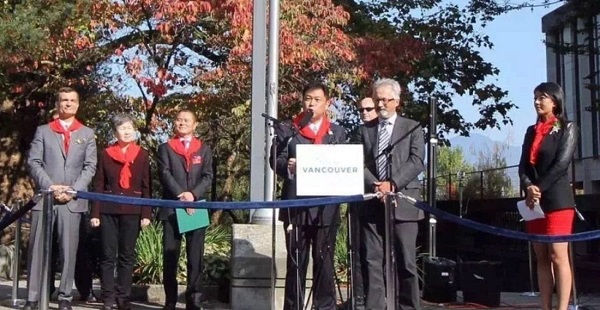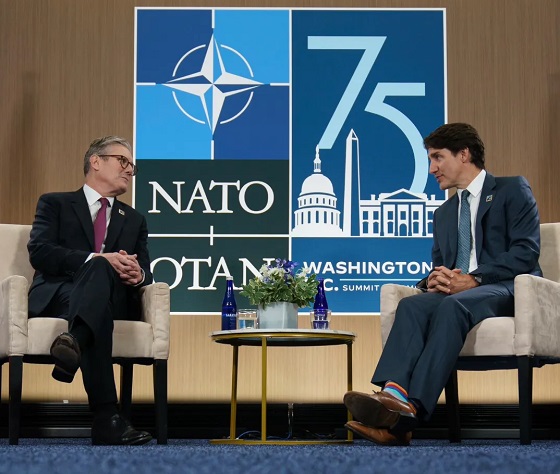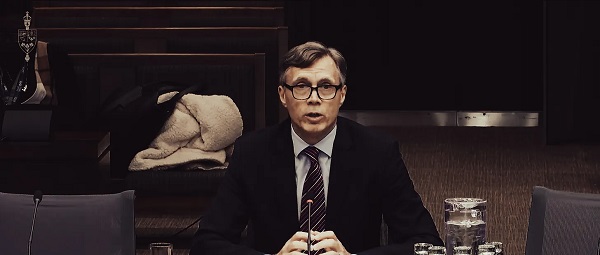espionage
CSIS report says China infiltrated Provincial and Federal Party leadership races in 2022

Some Chinese-Canadians were troubled by a controversial PRC-flag raising at Vancouver City Hall in October 2016, where some local politicians donned CCP scarves.
 Sam Cooper
Sam Cooper
Canadian Mayoral candidate got clandestine financial support from community leaders mobilized by Chinese Consulate in 2022 and 2018: “Intelligence Assessment”
Editor’s Note:
We are reposting this exclusive story because its explosive findings—drawn from a leaked October 2022 CSIS Intelligence Assessment and The Bureau’s 2023 investigative analysis—offer an unmatched window into foreign interference in Canadian democracy at a critical moment. Newly appointed Prime Minister Mark Carney is reportedly set to call a federal election within days, amid escalating geopolitical stakes.
Tensions with Washington remain severe under President Trump’s aggressive stance. In an interview on March 18, 2025, Trump stated, “I think it’s easier to deal actually with a Liberal, and maybe they’re going to win, but I don’t really care,” implying a preference for Carney. He also criticized Pierre Poilievre, saying, “the Conservative that’s running is, stupidly, no friend of mine.” Some observers argue that these increasingly forceful statements—amid Trump’s threats to impose or expand tariffs on Canada, China, and Mexico—may destabilize Canadian society and constitute a form of U.S. interference.
Nevertheless, Canada remains a member of the Five Eyes alliance and other Western security partnerships, even as the risk of broader conflict involving Russia and China intensifies.
Meanwhile, Canadian intelligence continues to classify China as the greatest threat by far to the nation’s sovereignty, citing expanding infiltration efforts across the political spectrum. As The Bureau reported yesterday, this interference—facilitated by Chinese Consulate officials working directly with diaspora community proxies—extends from local to federal levels.
A core revelation in this re-posted story is that a senior Canadian provincial politician allegedly covertly met with Chinese Consulate officials in 2022 and ultimately became Beijing’s favored candidate. The Bureau’s analysis indicates these Chinese United Front networks, particularly active in British Columbia, have reached into federal, provincial, and municipal politics. In Vancouver specifically, key operatives appear to support various figures across all three major parties—NDP, Conservative, and Liberal—including at least one unsuccessful contender in the 2022 Conservative leadership race.
Looking ahead to the impending federal election, there is evidence suggesting Pierre Poilievre was disfavored during the Conservatives’ 2022 leadership contest, owing to Beijing’s perception of him as hostile to Chinese interests. Meanwhile, Chinese media outlets have signaled Mark Carney was favored by Beijing’s networks in that recently concluded race, while Chrystia Freeland—Carney’s main opponent—was attacked on WeChat, a crucial vector of Chinese interference, according to The Bureau’s reporting yesterday.
The CSIS findings detailed in this report raise allegations of clandestine funding, covert meetings, and strategic influence operations stretching from municipal elections to federal leadership contests. The Bureau’s investigation shows how alleged Beijing proxies purchased party memberships to boost their preferred leadership candidates—often those deemed less “anti-China.” These activities align with earlier disinformation attacks on former Conservative leader Erin O’Toole in 2021, pointing to attempts to reshape Canada’s political landscape well before the coming federal contest.
With Carney’s rise occurring in a potentially compromised environment, urgent questions remain: Did Beijing’s tactics affect Carney’s leadership victory? Will these same networks shape the imminent election? And how will Trump’s vocal—and possibly intrusive—stance, alongside potential tariffs, further complicate Canada’s already fraught political climate?
VANCOUVER, Canada — A senior Canadian politician running to lead a provincial political party clandestinely met officials inside a Chinese Consulate in 2022, subsequently becoming China’s preferred candidate, and winning campaign support from Consulate proxies, a classified CSIS document alleges.
Details of the Consulate meeting are contained in a sweeping CSIS “Intelligence Assessment” dated October 31, 2022.
Without identifying candidates by name, it details Beijing’s efforts to influence leaders of Canadian parties – at the federal, provincial and municipal level – before and after recent elections.
The report’s chief allegation – Chinese officials arranged in June 2022 to surreptitiously meet an elected provincial official only identified as “CA3” — suggests CSIS monitored a particular candidate in Alberta or British Columbia.
This is because the B.C. NDP and Alberta United Conservatives were the only provincial parties reportedly selecting leaders in the June to October 2022 timeframe described by the Intelligence Assessment. Canada hosts four Chinese Consulates, in Vancouver, Calgary, Toronto and Montreal.
Responding to questions fromThe Bureau, the B.C. NDP and Alberta Conservatives both denied any awareness of the Chinese Consulate meeting alleged in the CSIS document.
But ramifications of the CSIS Intelligence Assessment are much broader than China’s interference in a single provincial leadership campaign.
The document strongly suggests that People’s Republic proxies financially infiltrated the federal Conservative’s 2022 leadership contest, shortly after leader Erin O’Toole was attacked with Chinese disinformation, during the fall 2021 federal election.
The Intelligence Assessment says proxies attempted to elect a federal party’s new leader, purchasing party memberships to support an unidentified candidate, with the objective of tempering the federal party’s perceived “anti-China” stance.
This document also refers to a “CA1” — believed to mean Candidate 1 — and points to a “meeting and the Consulate’s endorsement.”
“CA1 said they were unconcerned, as CA1 knows ‘how the underground works’ and that ‘they’ (the PRC Consulate) had supported CA1 in various past elections,” the CSIS document reviewed by The Bureau says.
It doesn’t explain who Candidate 1 is.
The October 2022 CSIS document also says hostile states secretly fund preferred candidates via community networks in Canada.
It cites successive elections in a particular Canadian city, where a Chinese Consulate mobilized three “co-opted” community groups to clandestinely channel funds and “material support” to an unidentified mayoral candidate in 2018 and 2022.
British Columbia has already been identified as a hotbed of Chinese election interference, because CSIS intelligence verified from multiple sources asserts that former Vancouver-area Conservative MP Kenny Chiu was attacked with Chinese disinformation in the 2021 election, because he proposed a foreign agent registry.
The October 2022 Intelligence Assessment alleging clandestine financial support of a mayoral candidate may also point to the Chinese Consulate in Vancouver and Mayor Ken Sim. This is because case details appear to align with allegations in another Top Secret CSIS report reviewed by The Bureau.
This previous, January 2022 document, says China’s Consul General in Vancouver “stated that they needed” to rally Chinese diaspora voters in Vancouver’s 2022 mayoral election “to come out and elect a specific Chinese-Canadian candidate,” because “the candidate will rely on those votes.”
The Globe and Mail previously reported some of the details from this January 2022 document, which names Vancouver’s Consul General, Tong Xiaoling.
What The Globe didn’t report, is the CSIS record’s summary conclusion, which says: “This report demonstrates CG Tong’s continued interest in involving herself in Canadian electoral processes to benefit the PRC.”
There is no suggestion in the October 2022 Intelligence Assessment the unidentified mayoral candidate or the provincially elected official “CA3” wittingly accepted support from China.
Furthermore the document contains intelligence, which doesn’t carry the same weight as evidence, and these cases haven’t been proven in election interference investigations.
 |
In December 2017, Premier John Horgan met with TONG Xiaoling, Consul General of the People’s Republic of China. Tong left her post July 28, 2022. [BC Government photo]
ButThe Bureau’s investigation of these new CSIS allegations, illuminates deeper concerns in the Chinese interference story that shocked Canadians over the past year, exposing gaps in Ottawa’s current foreign interference inquiry, which only mandates Justice Marie-Josée Hogue to examine the 2019 and 2021 federal elections.
This is shortsighted, according to political experts and the October 2022 Intelligence Assessment, which says “interference actors and activities can span various levels of government.”
“For this federal inquiry, it’s like they are examining their front doors, but they don’t realize the whole back wall of the house is missing,” said former Vancouver mayor Kennedy Stewart.
Stewart — a political scientist and former NDP Parliamentarian — defeated Sim by 957 votes in Vancouver’s 2018 election, and lost to Sim by over 36,000 votes in 2022.
“I don’t know if this interference, which I am now almost certain occurred, was enough to tip the balance in 2022,” Stewart said. “But it looks like it almost worked in 2018 too, which is shocking.”
Ken Sim’s office has not responded to questions from The Bureau for this story.
In March 2023 Sim reacted furiously to The Globe’s controversial report, saying “insinuations” that his campaign benefited from Chinese Consulate interference wouldn’t occur “if I was a Caucasian.”
In a lengthy interview, commenting on cases from the October 2022 Intelligence Assessment, Kennedy Stewart added: “I can’t help but think, in any other G7 country, this would be a red-alert that your systems are being compromised, and there would be an immediate cross-party effort to get to the bottom of it.”
“But here,” he said, “in fact, there’s been cross-party collusion to limit this inquiry, to just the federal level.”
The Bureau asked Canada’s federal police in Ottawa if any of the three CSIS cases outlined in this story are being investigated for People’s Republic election interference.
“Currently, the RCMP is assessing information in relation to foreign actor interference, including electoral interference,” spokesperson Robin Percival said. “While we can’t speak further about this, we can confirm that if criminal or illegal activities occurring in Canada are found to be backed by a foreign state, it is within the RCMP’s mandate to investigate this activity.
 |
In 2015, former B.C. Premier Christy Clark signed a deal with the People’s Liberation Army’s corporate arm, China Poly, drawing the province closer to Beijing.
“Sensitive Meeting”
The Intelligence Assessment says in June 2022, a “trusted contact” of a People’s Republic Consulate in Canada arranged “a ‘sensitive’ meeting with a provincially elected official.”
And this party leadership contender was to arrive at the Consulate in a separate vehicle and come in “via a side entrance,” the document says.
The meeting was to take place at a location inside the Consulate “where no outsider could observe the meeting taking place,” it adds.
The document doesn’t explain how CSIS learned of the June 2022 meeting arrangements.
But investigators captured an internal conversation evidently, because the CSIS record says “a PRC Consulate official noted that the arrangements were ‘slightly deceptive.’”
There is no explanation of what the provincially elected official and Consulate officials discussed, or what day they met.
But CSIS assessed, according to the document: “the PRC Consulate, after clandestinely meeting with CA3, signalled their preference for CA3 to the trusted contacts.”
And the candidate gained support after huddling with Chinese officials.
“Subsequently in July 2022, trusted contacts of the PRC Consulate organized a campaign rally for CA3 and the same trusted contacts have formalized their continued support for CA3 during the leadership nomination process.”
Charles Burton, a sinologist and former Canadian diplomat in China, said the case is unlike any to surface in previous reports of China’s election interference.
“I think the idea that a Canadian political candidate would make a clandestine visit to a Chinese diplomatic facility, is really shocking,” Burton said. “This is a whole different level of concern.”
Burton said diplomatic facilities typically have glass-walled, soundproof, secure-meeting rooms, where sensitive discussions can take place.
He said CSIS’s description of the Consulate meeting suggests Chinese officials could have met the candidate in a secure room.
“One would wonder if Candidate 3, being taken to the Consulate under surreptitious provisions, was taken into one of these rooms, to have a discussion that would not be monitored by CSIS,” Burton said.
“And one would be very concerned about what kind of undertakings the PRC might have made, to such a candidate.”
The CSIS Intelligence Assessment of this case, dated October 31, 2022, concluded that “trusted contacts … are now implementing the Consulate’s desires.”
Burton said, given what is knowable from the Intelligence Assessment and party leadership contests in Alberta and British Columbia, it is hard to discern who CA3 could be.
Alberta Premier Danielle Smith — who was not a provincially elected official during her party’s leadership race — defeated a number of elected MLAs on October 6, 2022, replacing Premier Jason Kenney.
In a final ballot vote, Smith beat the runner-up, Alberta’s finance minister Travis Toews, 46,400 votes to 36,400 votes.
The Bureau tried repeatedly and unsuccessfully to reach Toews to ask about his 2022 leadership campaign. Toews, a rancher and accountant, was first elected MLA in 2019 and retired before Alberta’s spring 2023 election.
“We are not aware of any leadership candidate participating in any such meeting,” United Conservative Party spokesman Dave Prisco emailed, in response to questions from The Bureau. “The UCP has stringent procedures.”
“Our verification and voting processes during the leadership contest were overseen by third-party auditors, scrutineers, and were streamed live on a publicly available webcam 24/7,” the UCP statement said “ensuring unparalleled transparency and accountability.”
The Alberta provincial government, like Ontario’s and New Brunswick’s, has a provincial intelligence office mandated to provide senior elected officials advice on foreign interference threats.
In British Columbia, no elected officials emerged to challenge attorney general David Eby in the race to replace Premier John Horgan, who stepped down in June 2022 for health reasons. Climate activist Anjali Appadurai — an outsider candidate — was disqualified by the B.C. NDP executive, purportedly for violating party membership rules. Eby was acclaimed party leader and effectively became B.C.’s premier on October 21, 2022.
A human rights lawyer who ran unsuccessfully for Vancouver City council in 2008, Eby was first elected for the B.C. NDP in Vancouver-Point Grey in 2013.
The Bureau asked Eby’s office and B.C. NDP to answer whether any elected provincial official running for party leadership was involved in a clandestine Consulate meeting and received support from Consulate contacts in July 2022.
“All of the allegations presented are completely false,” the premier’s spokesperson Jimmy Smith emailed in response.
“There is absolutely no truth to the assertion that Premier Eby had any meetings with or invited support from the Chinese Consulate, or any of their representatives, during his time as a candidate for the leadership of the BC NDP. The publishing of such an assertion is defamatory.”
Smith said the NDP government is working with Elections BC on potential reforms ahead of the October 2024 provincial election, and “these changes seek to increase transparency and prevent acts of foreign interference as well as clarify independence requirements for third-party sponsors.”
Eby’s spokesman did not answer whether B.C.’s government is looking into implementing a provincial security office such as Alberta’s and Ontario’s.
Incredibly Troubling
According to photos and a July 27, 2022, Chinese-language media report analyzed by The Bureau, leaders of the community group CCS100 were invited to attend Eby’s July 2022 campaign event in Vancouver and supported his party leadership bid.
The group lists Conservative Senator Victor Oh, who campaigned against a foreign agent registry in 2023, as an honorary advisor.
 |
In 2020 Attorney General David Eby (left) and B.C. Liberal MLA Michael Lee (right) met with Omni TV editor Ding Guo, of the CCS 100, which lists Conservative Senator Victor Oh as an honorary advisor. Guo, an advisor to Eby, says his group supported Eby’s leadership in July 2022.
The July 2022 Rise Media article, written by TV broadcaster Ding Guo, endorsed Eby’s leadership candidacy.
The piece argued Eby deserved support from Chinese-Canadian voters, although as NDP housing critic, he’d been accused of being “anti-Chinese” for participating in a study that probed Mainland China investment in Vancouver real estate.
But Eby made amends by visiting editors at a Mandarin-language TV station in Vancouver and repeatedly apologized for “inappropriate remarks he made on the issue of Chinese real estate speculation in 2015,” the July 2022 article says.
The October 2022 Intelligence Assessment observes that generally, Beijing has completed a “takeover” of Chinese-language media in Canada and seeks to “manipulate and influence key media entities,” during election periods.
In an interview Brad West, mayor of the Vancouver-area municipality Port Coquitlam, said information in the October 2022 Intelligence Assessment resonates with his awareness of CSIS concerns in Canada.
“What you read to me is incredibly troubling and concerning that they’re operating at that high of a level,” West said, of allegations that an elected provincial official met clandestinely with Consular officials, and that a Canadian mayoral candidate received funding from co-opted community leaders.
“Not only are they trying to support and elevate people who they believe they can have a relationship with into positions of greater influence,” West said, “but they also try to identify threats and neutralize them.”
West says after CSIS warned him in 2020 the Vancouver Chinese Consulate was enraged with his criticism of Beijing’s influence in B.C. politics, Chinese community sources informed him in 2022, that pro-Beijing community leaders had unsuccessfully attempted to recruit a mayoral candidate to defeat West in Port Coquitlam’s election. CSIS has not commented on West’s allegations.
“They want these politicians to think that, if they hope to have the support of the Chinese community and Chinese voters, then it must go through officials of the Chinese Communist Party,” West said. “That in of itself, is insulting and racist.”
The October 2022 Intelligence Assessment makes a similar point.
“Trusted interlocutors such as proxy agents or co-opted community organizations,” are used to “channel monetary donations and other assistance to preferred candidates in elections, with the intent of fostering a bond of obligation,” the document says.
But support from these “gatekeepers” is transitory.
“If the preferred candidate pursues a course of action contrary to that of the foreign state,” the document says, “community support would likely be withdrawn and the candidate could potentially lose their next election.”
“Elect the next leader of a federal political party”
A prominent theme of The Bureau’s analysis on China’s election interference has been that Beijing favoured Justin Trudeau’s Liberal Party in the 2019 and 2021 contests, and Trudeau’s government has failed to counter foreign interference, perhaps because Trudeau is benefiting.
Among a number of CSIS documents reviewed by The Bureau, a December 20, 2021 report says the loss of two incumbent Conservative MPs in the 2021 federal election showed Mainland Chinese immigrants were “beginning to show their strength during elections.”
And People’s Republic diplomats planned to target Chinese-Canadians in upcoming federal elections with this message: “The Liberal Party of Canada is becoming the only party that the PRC can support.”
It’s believed that Vancouver-area Conservatives Kenny Chiu and Alice Wong are the two defeated MPs referred to, and CSIS gleaned this intelligence from Vancouver’s Chinese Consulate.
But other documents describe different angles to Beijing’s sophisticated interference in 2019 and 2021, including calibrated support for some federal Conservative politicians.
Under the subheading “Money” the October 2022 Intelligence Assessment seems to demonstrate such a case — indicating that in 2022 “a PRC-linked proxy” was attempting to “help elect the next leader of a federal political party in Canada.”
This unidentified Chinese agent “and their associates” were “actively signing up party members – and paying their membership fees – in order to support a particular leadership candidate,” the document says.
It adds the proxy was also “encouraging individuals who are supportive of the Chinese Communist Party in Canada to join this same political party in an effort to influence ‘the party towards having a more positive view of China.’”
The Intelligence Assessment continues to say the Chinese agent in question, “argues that this Canadian political party is being influenced by members of the Falun Gong … and as a result, is ‘anti-China.’”
In conclusion, it says: “The proxy perceives that if they can successfully get the leadership candidate elected, the proxy and their associates will “have some level of control” within the party, and might even be able to secure a powerful party position.”
Both the Conservative Party and Green Party held leadership contests after the 2021 federal election. The Green Party — which advocated for the release of Meng Wanzhou and has only two seats in Parliament — doesn’t appear to be the party described in the Intelligence Assessment.
But political insiders with knowledge of the Conservative’s 2022 leadership race said the case aligns with incidents they are aware of.
In October 2021, a Chinese community group made headlines, asking O’Toole to step down and claiming his criticism of Beijing had alienated Chinese-Canadian voters.
The same group subsequently supported a Conservative leadership candidate that was disqualified by the party in mid-2022, several months before Pierre Poilievre won the Conservative leadership race.
In an interview O’Toole, now a corporate consultant, said the October 2022 Intelligence Assessment “confirms what I had heard speculated about in the aftermath of the 2021 election.”
“It is very troubling, and shows why we need Justice Hogue to push the boundaries of her terms of reference,” O’Toole said, “so that we can properly understand risks to our democracy, and protect it.”
But party spokesperson Sarah Fischer stated “The Conservative Party of Canada is not aware of the allegations you mention.”
“Party memberships purchased during the last leadership race could only be purchased with a personal credit card, personal cheque or Canadian bank-issued money order,” Fischer said, in response to The Bureau’s questions.
Fischer added the party “implemented a number of measures to protect against the inappropriate purchase of party memberships.”
“Conservative Leader Pierre Poilievre has consistently been outspoken against Beijing’s interference in our democracy and will continue to be,” she said.
In an interview Charles Burton, the former Canadian diplomat, said it makes sense that Beijing would attempt to elect a new Conservative leader less hawkish than O’Toole.
He says during the leadership race in 2022, he discovered a WeChat post that called Poilievre an anti-Chinese racist, and warned Poilievre would make Kenny Chiu — the Richmond, B.C., MP attacked on WeChat and defeated in 2021 — foreign minister in a Conservative government.
“Certainly there is concern that a Conservative government might adopt positions similar to Erin O’Toole’s platform,” Burton said. “And China is rightly concerned that Conservatives will adopt a position on China that is aligned with the United States.”
Burton added Conservative leadership race allegations speak to the “well-funded, well-staffed, highly multi-variegated” influence operations of China’s Ministry of State Security and United Front Work Department networks in Canada.
“In addition to supporting candidates from preferred parties, they will also look to candidates in the opposition party,” Burton said, “to get more people into Parliament and Parliamentary committees.”
“Community Networks”
In interviews, Kennedy Stewart said in late May 2022, CSIS warned him China would likely interfere in Vancouver’s upcoming municipal election. And Chinese-media entities, partly owned by Beijing, were part of the threat.
This wasn’t a big surprise, Stewart said, adding he believes the City of Vancouver and Elections BC have few tools to discern provenance of funds in Vancouver elections.
“There is no doubt in my mind there has been foreign interference in Vancouver politics for many years,” Stewart said, “and there is little you can do about it at the local level.”
 |
“I’m looking out my window here, and seeing a Trillion-Dollars of real estate in Vancouver,” Stewart told The Bureau.
Vancouver politicos point to the city’s 2005 election, when speculation swirled around the campaign of right-leaning candidate Sam Sullivan.
One of Sullivan’s first moves as mayor was ordering Falun Gong to dismantle a protest hut erected outside the gates of China’s Consulate on Granville Street.
In a court case that followed, Sullivan — a fluent Mandarin speaker — acknowledged he had dined privately with Consular officials before moving a bylaw to restrict Falun Gong’s protest.
But Sullivan denied he was influenced. He went on to become an MLA for the B.C. Liberal Party, which forged deep ties with Beijing — including dealings with the People’s Liberation Army — under Premier Christy Clark.
Under the heading “Community Networks” the October 2022 Intelligence Assessment explains Beijing’s interference is woven throughout Canadian democracy in hidden social webs consisting of Consular officials, “leaders of local Chinese Canadian community groups,” political staffers and targeted “political candidates/officials themselves.”
This system “enables an adaptable, resilient approach to extending and enabling PRC covert influence,” the document says, adding “the role played by each component varies by location and campaign.”
It continues, saying “CSIS intelligence from November 2021 and late April/early May 2022,” found a People’s Republic Consulate was “clandestinely supporting a particular mayoral candidate” in an upcoming municipal election.
“The Consulate has mobilized the leadership of three co-opted Chinese Canadian community groups to provide material and financial support for this candidate,” the Intelligence Assessment says.
“It is noteworthy that the PRC Consulate supported this same mayoral candidate in the 2018 municipal election, and used the same community groups to clandestinely channel this support.”
Elections BC donation records indicate the leaders of a Chinese community group that is affiliated to the Vancouver Consulate and has been investigated in RCMP’s so-called Chinese police station probe, donated to Sim’s successful 2022 campaign.
Mayor Ken Sim’s office hasn’t yet responded toThe Bureau’s questions for this story.
Another intelligence record reviewed by The Bureau, a 2019 document from NSICOP — Parliament’s bipartisan intelligence review body — says “the PRC Consul General in Vancouver also boasted that she controlled over 100 community groups.”
“Now two elections in a row”
In an interview Stewart said what stands out, in hindsight, is that his pollster had forecast a large margin of winning votes that evaporated in the closing days of the 2018 election.
Again in the 2022 election, Stewart’s optimistic vote tally collapsed in the final week, he says. Meanwhile, voters that were invisible to Stewart’s pre-election polling seemed to materialize for Sim.
“Now two elections in a row, you have this kind of very strange behaviour that defies political science,” Stewart said. “But now, the fog is starting to lift. This [Intelligence Assessment] is a report from CSIS. So I have to believe it. And this is why an inquiry is so important, to reassure Canadians of their democratic process.”
While previous reports have noted Tong Xiaoling, the Consul-General who departed her post July 28, 2022, was displeased with Stewart’s friendly posture towards Taiwan, Stewart thinks Vancouver real estate is the real key to China’s election interference.
Stewart says he suspects most of Vancouver’s development is driven by investors from Mainland China, and Vancouver developers effectively control the majority of municipal campaign donations.
“About three weeks out from the election in 2022, my funding just stopped,” Stewart said.
“I’m looking out my window here, and seeing a Trillion-Dollars of real estate in Vancouver,” he added. “There’s a lot to play for here. And all of it is controlled by six votes on an 11-member council. You can turn a single family home into a 60-story-tower, overnight.”
The Bureau is a reader-supported publication.
To receive new posts and support my work, consider becoming a free or paid subscriber.
Business
Daily Caller EXCLUSIVE: Chinese Gov’t-Tied Network Training Illegal Immigrants To Drive Big Rigs In US


From the Daily Caller News Foundation
Chinese illegal immigrants are obtaining commercial driver’s licenses (CDL) and landing jobs in the U.S. trucking industry with support from a Chinese government-linked network, a Daily Caller News Foundation investigation discovered.
The Chinese American Trucker Organization USA Inc. (CATOU) is a New York-based nonprofit trade organization registered as a 501(c)6 that has allegedly helped over 1,000 Chinese students obtain CDLs and has a 100% pass rate, according to its business filings, social media posts and website. Videos posted on social media by an individual who crossed the U.S. southern border illegally shows they were able to rapidly obtain California CDLs after taking courses taught by CATOU instructors.
The public safety concern presented by truckers with unknown criminal backgrounds and driving records is compounded by CATOU’s board chairwoman, Geng Hang, who has held leadership roles within organizations operating as arms of the Chinese government and a Chinese Communist Part (CCP) influence and intelligence agency called the United Front Work Department (UFWD), according to DCNF translations of announcements from those entities.
“No way American citizens voted for the California gateway for illegal migrants to operate heavy vehicles throughout America. That of itself is a public safety and homeland security concern,” Steve Yates, senior research fellow for China and national security policy at the Heritage Foundation, told the DCNF.
“Having a large CCP-tied network further train, certify, and place ‘their’ illegal migrants throughout vital surface shipping routes — urban, rural, and interstate — elevates national security risks,” Yates said. “At a time of high tension, crisis, or conflict with the CCP, what confidence could we have this network could not and would not be used against us?”
CATOU and Geng did not respond to multiple requests for comment.

[Image created by DCNF with pictures from ASGCC and Qiaobao]
‘Not One Has Failed So Far’
Chinese social media posts show CATOU instructors teaching students about the trucking industry inside the New York office of Red Apple Employment Agency, which is also led by Geng, and helps Chinese nationals both with and “without proper status” find work for “$80 to $100 per job placement,” The Wall Street Journal reported in July 2024.
While the DCNF found no New York business filing for Red Apple Employment Agency, the agency’s office displays signs featuring both CATOU and its name, videos posted by CATOU on Chinese social media reveal.
CATOU members have also taught truck driving courses at 7 CDL Driving School in Manassas, Virginia, videos within posts from the X account @tiange999 show. The driving school shares its address with a trucking company that Geng owns called Red Apple Enterprises Inc., according to business filings and 7 CDL’s website.
“The driving school where I’m studying has trained over 1,000 Chinese students and not one has failed so far,” @tiange999 wrote in a September 2024 X post featuring videos filmed with a CATOU instructor at 7 CDL Driving School, according to a DCNF translation. “Experienced students can pass in just one week, while those with no driving experience pass in about a month.”
The @tiange999 account is operated by a Chinese national who traveled up from South America and Central America into North America before crossing the U.S. southern border in June 2023. The owner of the account has since referred to himself as someone who “walked the line,” which is a “euphemism for illegal migration out of China,” Simon Hankinson, senior research fellow at the Heritage Foundation’s Center For Border Security and Immigration, testified during a May 2024 hearing held by the House Committee on Homeland Security’s Subcommittee on Oversight, Investigations, and Accountability.
Roughly 8.5 million illegal aliens were encountered at the U.S. southern border during the Biden administration, including over 182,000 Chinese nationals from fiscal years 2021-2024, a spokeswoman for Customs and Border Protection told the DCNF.
The @tiange999 account also features videos detailing how he passed the CDL test at 7 CDL Driving School and ultimately obtained CDL qualification in less than two months after first announcing he’d received a California driver’s license in August 2024.
More recent posts show @tiange999 driving a coach bus with identification numbers revealing his employer to be NC Transfer Inc., which has branches in North Carolina and New York, according to business filings.
The Trump administration is ramping up scrutiny of the trucking industry following a deadly August 2025 crash in Florida involving an illegal immigrant truck driver with a California CDL, according to the Department of Homeland Security. The truck driver has been charged with three counts of vehicular homicide and a preliminary Department of Transportation (DOT) investigation allegedly discovered he “did not speak English.”
“I would say just the drivers alone is not scary enough on the national security front,” Justin Martin, a 15-year trucking industry veteran, told the DCNF.
“These guys are already here, and they’re already operating, and it doesn’t matter how many of these trucks you catch or how many of these drivers you shut down, they’re just going to get hired somewhere else until they start going after the companies and the owners of these companies and shutting them down and preventing them from coming back,” Martin said.

[Image created by the DCNF with screenshots of @tiange999’s X account]
‘Foreign Actors’
CATOU’s chairwoman, Geng, has served as an official in multiple organizations advancing Chinese influence and intelligence efforts in the U.S., including one entity that has held meetings in the New York office shared by CATOU and Red Apple Employment Agency, according to DCNF translations of Chinese media reports, social media posts, and the organizations’ announcements.
Among other Chinese government-tied leadership positions, the website of a New York nonprofit called the American Shaanxi General Chamber of Commerce (ASGCC) identifies Geng as its deputy chairwoman, according to a DCNF translation. ASGCC operates as a branch of the Shaanxi provincial Department of Commerce as well as a “sister association” of a UFWD arm called the China Overseas Friendship Association (COFA), according to DCNF translations of ASGCC and COFA announcements.
ASGCC has repeatedly met with Chinese government officials, including in June 2009, when the nonprofit welcomed a delegation from the Shaanxi government and the UFWD‘s Chinese People’s Association For Friendship With Foreign Countries to discuss U.S. investment in China, according to DCNF translations of ASGCC announcements. Geng presented the delegation’s head with flowers at the airport, and she and other ASGCC members later serenaded the officials with songs like “Nanniwan,” which commemorates the CCP and Chinese military, according to Chinese state media.
Photos accompanying a January 2015 social media post made by ASGCC’s chairman also show ASGCC has held meetings within the shared New York office of CATOU and Red Apple Employment Agency.
“We are slowly giving over our entire truck industry to foreign actors,” Gord Magill, a truck industry writer, told the DCNF.
“I think foreign actors are fully aware that America’s corporations engaging in wage arbitrage and wage suppression against their own people are presenting opportunities for them to extract and scrape value out of the U.S. and give them some kind of strategic advantage in knowing exactly how our transportation systems work, and they’re just leveraging it for their own ends at the cost of American jobs and American motorists’ safety,” Magill said.
ASGCC, Red Apple Employment Agency, 7 CDL Driving School, Red Apple Enterprises, @tiange999, NC Transfer Inc. and DOT did not respond to multiple requests for comment.
espionage
Starmer Faces Questions Over Suppressed China Spy Case, Echoing Trudeau’s Beijing Scandals

Alleged political meddling in a collapsed espionage case targeting Starmer’s China-critical opponents sparks crisis of confidence in Whitehall’s independence.
Keir Starmer’s government is undergoing a credibility crisis over national security, with the Prime Minister himself facing mounting questions about whether he wielded political influence to have Whitehall’s independent prosecution service abruptly drop a rare Official Secrets Act case alleging a China-directed political-intelligence network inside Parliament — one that reportedly targeted Starmer’s opponents critical of Beijing.
Two men — parliamentary researcher Christopher Cash and academic Christopher Berry — had been due to stand trial this autumn, accused of gathering sensitive political research from Westminster between late 2021 and February 2023, including on the China Research Group of Beijing-sceptic MPs, and funnelling it onward to a senior figure in the Chinese Communist Party.
“The government deliberately collapsed the trial of two people who spied on MPs for China. I’m one of the sanctioned MPs & we will get to the truth about who ordered this. I believe this goes all the way to the top,” Conservative MP Neil O’Brien wrote Sunday.
The geopolitical echoes of this case resonate far beyond Westminster. A similar pattern has unfolded in Canada, where Justin Trudeau’s Liberal government — also perceived as favouring trade and engagement with Beijing — was accused of turning a blind eye to intelligence warnings that China’s Ministry of State Security was gathering information on Conservative MPs critical of Beijing, including Michael Chong, who incurred China’s wrath by sponsoring a motion recognizing the CCP’s repression of Uyghurs as genocide.
Multiple outlets have reported that British intelligence believed the information gathered on Conservative MPs critical of China inside Whitehall was destined for Cai Qi, China’s fifth-ranking leader, a Politburo Standing Committee member and confidant of Xi Jinping. The Guardian’s reporting of Cai’s alleged role underscores the extraordinary level of authority to which information targeting British parliamentarians may have been directed. The China Research Group itself included high-profile MPs such as Iain Duncan Smith, Tom Tugendhat, and Neil O’Brien — all sanctioned by Beijing for their outspoken positions on Hong Kong, Xinjiang, and broader human-rights issues.
In Canada, a similar pattern emerged when Conservative MP Michael Chong was likewise sanctioned by China and later revealed as a target of Ministry of State Security intelligence-gathering. Justin Trudeau and his staff were accused of failing to alert Chong to Canadian intelligence reports forwarded to the Prime Minister’s senior officials, which detailed Beijing’s targeting of Chong and his family in Hong Kong.
The emerging evidence of parallels is striking: in both countries, during the same 2021 time period, legislators sanctioned and vilified by Beijing were simultaneously subjected to covert information-collection efforts — suggesting a coordinated strategy by the Chinese Communist Party to identify, monitor, and neutralise its most vocal democratic critics.
At the centre of the growing political storm in Whitehall is an allegation that echoes Justin Trudeau’s reported downplaying of threats against his Conservative opponents. In London, the claim is that Downing Street’s top security adviser, Jonathan Powell, decided the government would not permit China to be described in court as an “enemy” — language prosecutors believed was essential to meet the statute’s threshold. After that decision, the Crown Prosecution Service declared it could no longer proceed for “evidential reasons,” and the case collapsed. If accurate, the intervention would represent an extraordinary instance of political calculation colliding with the operational demands of counter-espionage.
With new reporting from Britain today, Starmer is coming under scrutiny for a potential motivation behind what would amount to improper meddling in an independent prosecution — driven, critics say, by Labour’s desire to sweeten relations with Beijing for economic reasons.
Downing Street’s official response to the dropped prosecution has only fuelled the political fire. The Prime Minister’s spokesperson said it was “extremely disappointing” that the CPS decision meant Cash and Berry would not face trial, insisting the decision was “made rightly independently of government.” That claim of independence, however, now looks increasingly hollow in light of Times and Telegraph reporting that the decisive instruction on the “enemy” wording originated from Starmer’s own national-security team.
The move — and the CPS’s refusal to explain why it could present no evidence — has triggered outrage across party lines. Former Conservative security minister Tom Tugendhat, joined by four other MPs, has written to Director of Public Prosecutions Stephen Parkinson demanding a full account of the decision to drop the case and clarification of any communications between the CPS, No. 10, and the Cabinet Office.
The legal explanation for the collapse of this explosive case is technical: the wording of the 1911 Official Secrets Act, which criminalised acts “useful to an enemy.” Prosecutors reportedly determined that to meet the statutory threshold, China would need to be explicitly designated an enemy — a label the current government refused to authorise.
The National Security Act 2023, which replaced the century-old statute, eliminates that outdated “enemy” clause and creates broader offences for “foreign interference” and “assisting a foreign power.” But the new law came into force only in December 2023 and cannot be applied retrospectively to alleged conduct that occurred between 2021 and 2023, according to several legal experts.
In Canada’s Foreign Interference Inquiry, Trudeau faced questioning on his government’s lack of response to CSIS’s “Targeting Paper” — a high-level intelligence document that described how Beijing collected information to classify which Canadian MPs could help China and which could hurt it, in apparent efforts to guide Beijing’s election interference and political influence campaigns.
Trudeau and his senior aides claim he was never informed of the explosive report. Drafted in 2021 and circulated to a small number of public servants in 2023, the Targeting Paper “named names” and outlined how Chinese diplomats categorised Canadian parliamentarians into three groups: those friendly towards Beijing, those neutral or persuadable, and those deemed antagonistic due to their criticism of China’s human-rights record, particularly on issues like the Uyghurs and Hong Kong.
Echoing the allegations now confronting Starmer’s government, Trudeau’s national security adviser and senior bureaucrats reportedly refused to adopt Canadian intelligence’s view that Beijing’s targeting of MPs represented a serious national-security threat that could undermine Canada’s sovereignty, testimony from Ottawa’s inquiry suggested.
In the hearings, Trudeau’s former senior officials Jody Thomas and Janice Charette defended their decisions not to escalate two high-impact 2022 intelligence reports on Chinese interference — including the Targeting Paper — to the Prime Minister.
-

 National12 hours ago
National12 hours agoCanada’s birth rate plummets to an all-time low
-

 Agriculture1 day ago
Agriculture1 day agoCarney’s nation-building plan forgets food
-

 Fraser Institute1 day ago
Fraser Institute1 day agoAboriginal rights now more constitutionally powerful than any Charter right
-

 Alberta1 day ago
Alberta1 day agoAlberta puts pressure on the federal government’s euthanasia regime
-

 Business14 hours ago
Business14 hours agoElon Musk announces ‘Grokipedia’ project after Tucker Carlson highlights Wikipedia bias
-

 Crime12 hours ago
Crime12 hours agoPierre Poilievre says Christians may be ‘number one’ target of hate violence in Canada
-

 Red Deer1 day ago
Red Deer1 day agoThe City or Red Deer Financial Troubles: The Role of Good Governance, Effective Policies and Key Performance Metrics.
-

 Business1 day ago
Business1 day agoDemocracy Watch Drops a Bomb on Parliament Hill







